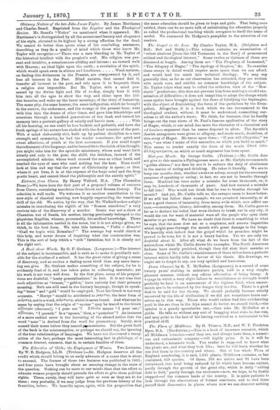The Gospel in the Law. By Charles Taylor, M.A. (Deighton
and Bell : Bell and Daldy.)—This volume contains an examination of "select citations [from the Old Testament in the Now] of pronounced critical and theological interest." Some twelve or thirteen of these aro discussed at length. Among them are "The Prophecy of Immanuel," "The Allegory of Hagar," "The Apology of Stephen," ikc. To examine these essays in detail would require more space than we can afford, and would lead too much into technical theology. We may say generally that, as far as our observation has extended, they are written with much care, and exhibit no common knowledge of the subject. Mr. Taylor takes what may be called the orthodox view of the "Mes- sianic" predictions; this does not pre vent him from making a candid exa- mination of difficulties ; it does not tempt him to adopt the charge which some cynics have brought against the Jews of falsifying the Septuagint, with the object of diminishing the force of the quotations by tho Evan- gelists. Altogether, it is a book which we can recommend to the theological student, without, it must be understood, committing our- selves to all the author's views. We think, for instance, that he hardly brings out the true views of St. Paul's famous application of the story of Hagar, which, to our mind, has more the character of a rhetorical and ad hominem argument than he seems disposed to allow. The Apostle's Jewish antagonists were given to allegory, and made much, doubtless, of this story of Hagar. He turns upon them ; "If you will allegorize," he says, "see what I make of this narrative, on which you build so much." This seems to render exactly tho force of the words arini io`rts, aXXvopo61.6tya, on which so much argument has been spent.










































 Previous page
Previous page